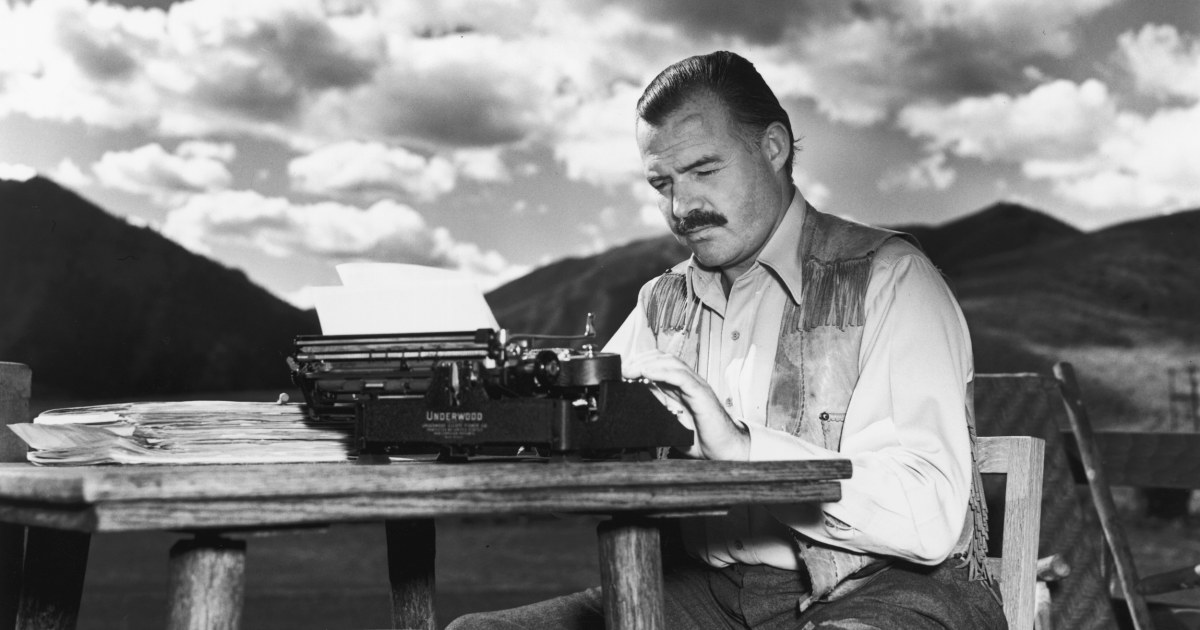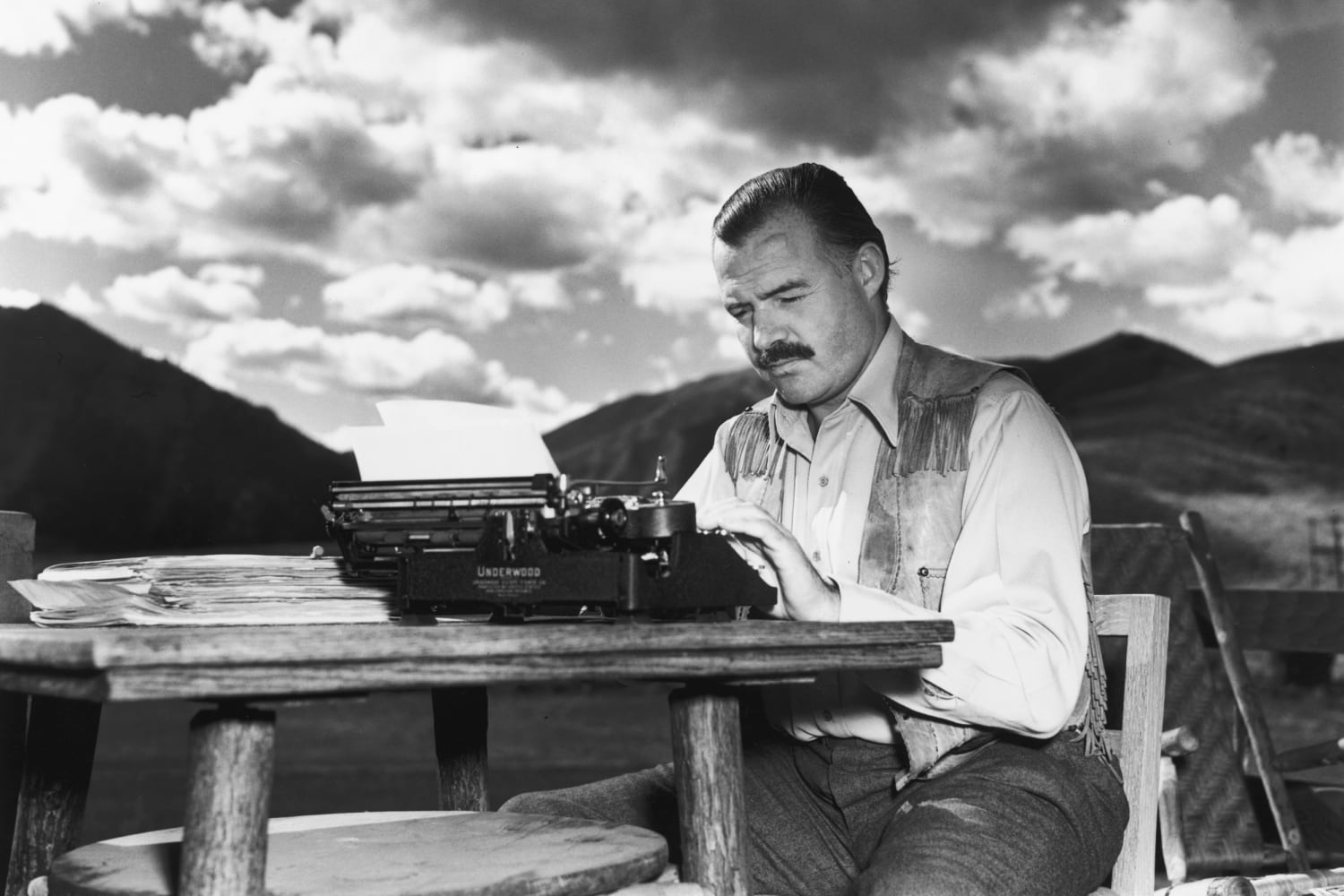
Ken Burns and Lynn Novick usually make documentaries about expansive subjects: baseball, jazz, the Vietnam War. But with their new project, Burns and Novick zoomed in on the life of one person: Ernest Hemingway, the self-styled “papa” of American literature.
“Hemingway,” a three-part, six-hour documentary that premieres Monday on PBS, paints a staggeringly complex portrait of the man and writer. Burns and Novick pay tribute to his exquisitely spare prose without shying away from the toxic dimensions of his turbulent life: the misogyny, racism and anti-Semitism; the personal betrayals, verbal abuse and casual cruelty.
Burns and Novick, drawing from archival materials and scholarship, attempt to break through the mythology of Hemingway, chipping away at the masculine bravado to reveal a layered, deeply insecure person haunted by mental illness. (The film’s lineup of literary talking heads, including the authors Edna O’Brien, Tobias Wolff and Mary Karr, adds crucial insights.)
In a Zoom conversation last week, Burns and Novick discussed their interest in Hemingway’s endless “contradictions” as well as their own personal relationships with his celebrated body of work. Burns also responded to recent criticism of PBS over a lack of diversity and an “over-reliance” on his nonfiction work. Here are edited excerpts from that conversation.
NBC News: The film highlights how often Hemingway embellished or exaggerated his own life story, cultivating a mythology around his macho public image. What parts of the Hemingway mythos were you most interested in deconstructing?
Ken Burns: That’s a wonderful question. I’m not sure we had an agenda other than to try to come to terms with this extraordinary writer and his complicated life, but I knew the mythology would be a barrier we would need to get around.
For us, it’s basic: We say yes [to the project], and that means yes to marrying Ernest Hemingway for many years in all the complexity, all the contradictions, all the horrible stuff and all the wonderful stuff. Along the way, as we began to accumulate a working sense of the biography, we saw the poisonous, toxic nature of Hemingway’s self-created myth.
I remember giving a commencement address a number of years ago, and my advice to seniors was that insecurity makes liars of us all. I think it’s a truism. And with regard to Hemingway: From an early age, his vulnerabilities, sensitivities and perhaps mental illness helped persuade him to construct this mythology that would be so constricting.
Lynn Novick: Mary Karr says in the film, “[Hemingway’s] masculinity must have been so constricting.” It stayed with us because I don’t think I ever really thought about that as a constricting problem. But in many ways he was imprisoned by this macho persona — a hypermasculine persona that, at the time, was seen as a positive thing.
Burns: Mary implies how tiring it must be. It’s wearying to maintain that edifice, because it is an attempt to maintain a kind of control that none of us have.
It’s so interesting that his writing is so frank and direct about the lack of control that any of us have. He’s acutely aware of the finite nature of our existence, and yet so much of what all of us do is [say], “Pay no attention to that dark-clothed figure with the scythe behind the curtain.”
Ken, “Hemingway” marks only the second time you’ve profiled a novelist. What drew you both to Hemingway as a documentary subject? Did either of you have special affinity for his work?
Novick: We both have an affinity. I read him in high school English class, and I was totally mesmerized and transfixed with “The Sun Also Rises.” The world he conjured and the characters, who were so vividly portrayed they seemed like real people. It was a wonderful way to become a serious reader of literature.
I then went to visit his home in Key West in the 1990s. Ken and I had worked together for a few years, and I came back and said, “We have to do Hemingway.” He had already been thinking about Hemingway, so it was a great convergence.
Burns: I had read him in high school, like Lynn. I was drawn to him, mesmerized by him. I wanted to be a writer. I read [the short story] “The Killers” at 15 and it freaked me out, because there was so much unsaid.
Novick: I think doing a film about a writer is challenging. The writer’s work is on the page, but we have to bring it to life and somehow give the audience a chance to see how we imagine the fiction playing out. The work is done sitting in a room by yourself with your typewriter or your pencil, but that’s not very cinematic, so we had to come up with ways to represent his creative process and the actual masterpieces.
The version of Hemingway you present is extraordinarily complex: a brilliant prose stylist and storyteller who could be misogynistic, racist, cruel to the people around him. Do you find it challenging to separate the art from the artist?
Burns: It’s our job as filmmakers to show it all together — the complexity, the good and bad — and not separate the art from the artist in the film.
There’s simplistic storytelling, there’s moralistic storytelling, there’s storytelling where anybody with a white hat is good and anybody with a black hat is bad. But life doesn’t work that way, and real people aren’t that way. Everybody is complicated; a complicated human being is redundant. We’re obligated, as storytellers, to look for that.
We’re not afraid of saying he can be one thing and be another, and we don’t feel we have to jump in and make a facile judgement about him that would compel him to the dust heap or to the pantheon of history. He belongs in both places or neither — it’s really immaterial.
He is a human being who left an indelible mark in literature. He has many negative features that have to be called into question. We don’t have the authority to make a final judgement. We only have to say, “Here’s what it looks like. Here’s racism, intolerable anti-Semitism, bad treatment of wives, a toxic environment for kids at times and unnecessary cruelty to friends — and then this body of work, and sometimes a loving husband, and sometimes a loving father.”
Novick: You have to look at the whole. We hope that, in exploring [Hemingway’s life], the audience can make up their own minds.
There are moments in the film where we really lay bare some very difficult, problematic aspects of his life and his writing. Abraham Verghese, a writer whom we love and admire, at one point shakes his head [in the film] and says, “He’s deeply flawed, like you and me. But there he is.” That’s not to say it’s OK — but we’re saying, “There it is.”
In a letter released last week, nearly 140 nonfiction filmmakers criticized PBS executives for a lack of diversity and relying too heavily on white creators. I wanted to get your response to the letter.
Burns: First of all, I wholeheartedly support the objectives of the letter writers. I think this is hugely important, and one of the reasons we’ve been in public television has been a commitment to inclusion and diversity, and it’s been one we’ve taken on not just in our subject matters but within our own company.
But can we do better? Of course we can. Can PBS do better? Of course they can.
We’re going to be working with some of our underwriters to see if we can actually address it specifically in terms of real dollars. Most of the money that we raise doesn’t come from PBS; it comes from outside sources. We may be uniquely positioned to be able to help, in some way, as PBS and the letter writers grapple with an ongoing American story.
I’m just very proud that [PBS] does it as well as anybody else. The fact that it’s still not good enough? It just means we all have room for improvement.
Source: | This article originally belongs to Nbcnews.com










